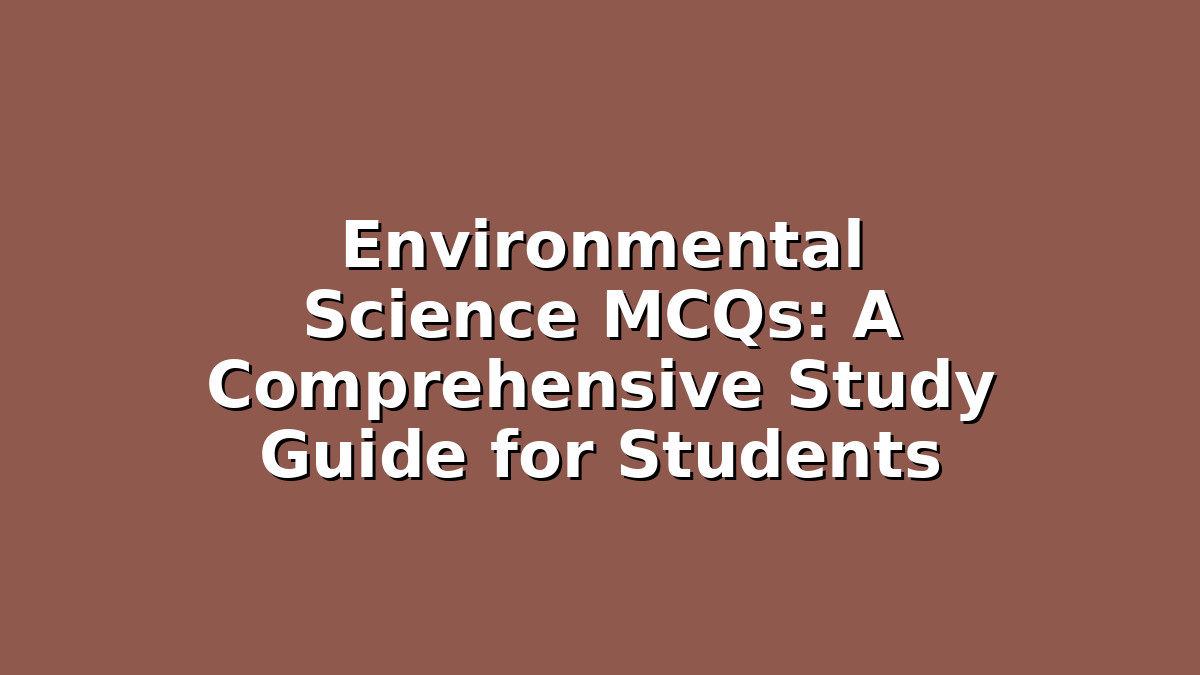Preparing for exams in environmental science can be both exciting and challenging. Whether you are a high school student, college undergrad, or preparing for competitive exams, mastering multiple-choice questions (MCQs) is crucial. MCQs test not only your knowledge but also your ability to quickly analyze and apply concepts. This article will guide you through effective strategies to tackle Environmental Science MCQs, offer tips on how to organize your study materials, and suggest practical ways to boost your retention and understanding.
Understanding the Importance of Environmental Science MCQs
Environmental science is a multidisciplinary field that integrates biology, chemistry, geography, and social sciences to understand the natural world and the impact of human activity on it. Exams often use MCQs because they efficiently assess a wide range of topics within limited time. These questions can span from definitions and factual knowledge to application-based scenarios and problem-solving.
For students, excelling in environmental science MCQs can open doors to scholarships, entrance exams, and career opportunities in fields like ecology, sustainability, environmental policy, and more. Therefore, approaching these questions with the right mindset and preparation techniques can make all the difference.
1. Build a Strong Foundation with Conceptual Clarity
Before diving into practice questions, ensure you have a solid grasp of fundamental concepts. Environmental science covers several key topics such as ecosystems, biodiversity, pollution, natural resources, climate change, and environmental laws.
How to achieve this:
– Use Standard Textbooks and Class Notes: Stick to your prescribed textbooks and class notes for accurate information. Make concise notes summarizing each chapter’s key points.
– Focus on Terminology: Many MCQs test your knowledge of specific terms like “biogeochemical cycles,” “carbon footprint,” or “acid rain.” Create flashcards of important terms and definitions.
– Understand Processes and Cycles: Rather than memorizing, try to understand how processes like the water cycle, nitrogen cycle, or photosynthesis work. Visual diagrams can help you retain this information better.
– Watch Educational Videos: Platforms like Khan Academy, CrashCourse, or National Geographic have excellent videos explaining complex topics in simple terms.
Tip: Spend time reading and re-reading your notes before attempting MCQs. If you find a question difficult, go back and revise the related concept.
2. Practice Regularly with Purposeful MCQs
Consistent practice is the key to mastering environmental science MCQs. But it’s not just about quantity—it’s about the quality of practice.
Effective practice strategies:
– Use Varied Question Banks: Collect MCQs from different sources such as previous year question papers, online quizzes, and reference books. This exposes you to a wider range of questions.
– Timed Practice Sessions: Simulate exam conditions by timing yourself. This helps improve your speed and accuracy, two crucial elements in MCQ exams.
– Analyze Your Mistakes: After each practice session, carefully review incorrect answers. Understand why you got them wrong and revisit the related concepts.
– Group Study Sessions: Sometimes discussing questions with peers can reveal different perspectives and deepen your understanding.
– Mock Tests: Take full-length mock tests periodically to build stamina and get used to the exam pattern.
Tip: Keep a notebook where you jot down difficult questions and their explanations. Reviewing this notebook before exams reinforces learning.
3. Develop Smart Exam Strategies for MCQs
Even if you know the content well, exam-day strategies can significantly impact your score. Here are some tips to approach environmental science MCQs smartly:
– Read Questions Carefully: Don’t rush. Sometimes MCQs include negatives (e.g., “Which of the following is NOT…”), so pay attention to every word.
– Eliminate Wrong Options: Narrow down your choices by removing obviously incorrect answers. This increases your chances if you need to guess.
– Look for Keywords: Words like “always,” “never,” or “except” can guide you toward the right answer.
– Use Logical Reasoning: If unsure, try to reason out the answer based on your understanding of environmental science principles.
– Manage Your Time: Don’t spend too much time on one question. Mark it and come back if time permits.
– Stay Calm and Confident: Anxiety can cloud your judgment. Take deep breaths and approach each question with a clear mind.
Additional tip: Some exams penalize wrong answers, so only guess if you can eliminate some options. Otherwise, it’s better to move on.
Conclusion
Environmental science MCQs are an excellent way to test and reinforce your understanding of a vast and vital subject. By building a strong conceptual foundation, practicing regularly with purpose, and applying smart exam strategies, you can tackle these questions confidently and improve your exam scores. Remember, consistent effort and a positive mindset are your best allies in any exam preparation journey. Keep learning, stay curious about the environment, and you’ll not only excel in exams but also develop a deeper appreciation of the world around you.
Good luck with your studies!

Responses